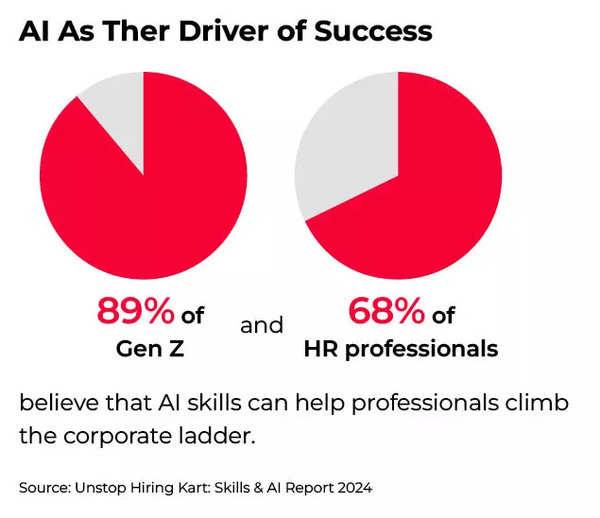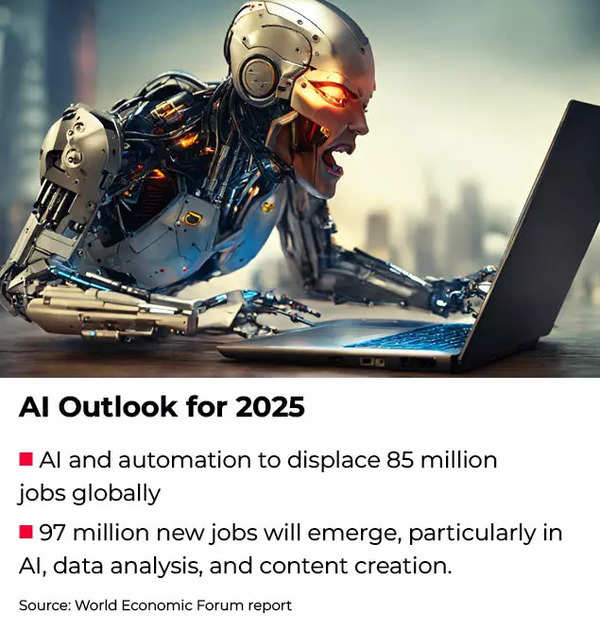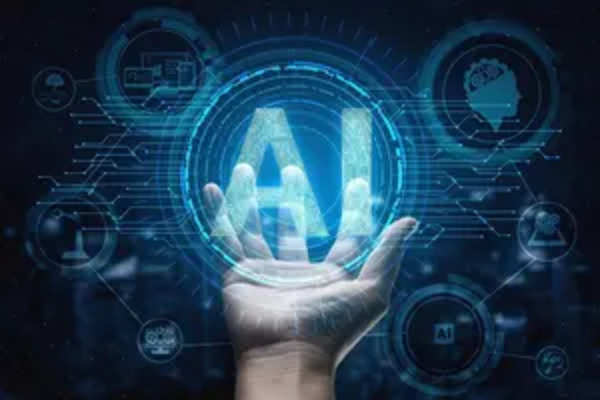
Robots will rule the world one day—This is a futuristic fantasy we once dreamt of in our childhood. Fast forward to today, and it’s no longer a distant vision: It’s a reality today, and sometimes a nightmare. Artificial intelligence, once etched in science fiction, has manifested into our reality. But are we truly celebrating this marvellous technology? While for some the answer is an emphatic 'yes' others are a bit apprehensive. Some herald this technological advancement to be groundbreaking research while others fear it as a harbinger of job loss and skill obsolescence.
The magic wand which has streamlined our tasks is also risking the young generation to be crippled. The Unstop Hiring Kart: Skills & AI Report 2024 brought forth by Unstop, a talent attraction, assessment and hiring platform, has turned its focus on this paradox. It has revealed certain startling facts: 89% of Gen Z and 68% of HR professionals believe that AI skills can help professionals climb the corporate ladder.

However, a huge segment of the young generation is skeptical of it taking away their skills. It raises a pressing question: Will AI nurture an overly reliant and skill-paralysed generation or will it foster a more intelligent, adaptable workforce tapping the ultimate potential of artificial intelligence? The tug of war will continue, but the fact is it will continue to dominate the cubicles and reshape work culture in more ways than one. The question now is not whether AI will change the workplace, but how far-reaching its influence will truly be in the years to come. Take a look at what lies ahead for the workspaces in the age of AI.
Key Insights of Unstop’s Hiring Kart: Skills & AI Report 2024
The Hiring Kart: Skills & AI Report 2024 by Unstop, released on Thursday, advocates for a complete revamp of curricula to focus more on job readiness. The report presents findings from a survey of 6,900 Gen Z professionals and 610 HR leaders, highlighting significant shifts in hiring trends and skill requirements. Take a look at the key insights provided by the report.
- AI Expertise and Higher Salaries: 89% of Gen Z and 68% of HR professionals agree that AI-trained candidates can command higher salaries.
- Discrepancy in AI Skill Perception: 45% of Gen Z see AI and data skills as essential, whereas only 14% of HR professionals share this view. Despite this, 65% of HR leaders report AI skills influence their hiring decisions, and 60% regularly use AI tools in their work.
- Obsolescence of Traditional Degrees: 93% of HR professionals and 78% of Gen Z respondents believe traditional degrees are losing relevance.
- Shifting Focus on Skills: The report emphasizes the need for both academia and companies to adjust their approaches to skills, hiring, and workplace preparedness.
- Concerns Over AI Dependency: Gen Z voices concerns about “intellectual dwarfism,” the idea that overreliance on AI could stifle creativity.
- Self-driven Upskilling: 60% of Gen Z professionals are independently upskilling through online courses, internships, and competitions to prepare for the evolving job market.
Is AI an enabling force or crippling the generations?
Reams of research have continually emphasised the importance of reaping the maximum benefits of artificial intelligence. It is more important than ever for Generation Z and millennials to arm themselves with appropriate AI competencies. However, over-reliance on artificial intelligence can lead to the waning away of critical thinking skills, creativity, and problem-solving.
AI as an Enabling Force
Artificial intelligence has emerged as a game-changer, reshaping industries and redefining the skills needed to thrive in today’s fast-paced world. For Generation Z and millennials, equipping themselves with AI competencies is no longer optional but a necessity. Insights from Unstop’s Hiring Kart: Skills & AI Report 2024 reveal that nearly half of Gen Z believes mastering AI skills is essential for navigating an increasingly unpredictable workplace. From automating repetitive tasks to enhancing creativity, AI offers unprecedented opportunities to boost efficiency and innovation. For many, it represents a stepping stone to achieving greater professional success.
AI as a Culprit
Despite its promise, the over-reliance on artificial intelligence comes with significant risks. As AI takes on tasks that require human intervention, there is growing concern about its impact on critical thinking, creativity, and problem-solving skills. Some young professionals fear that this powerful technology has relegated human intelligence to the sidelines, potentially dulling cognitive abilities over time. The Unstop report also highlights these apprehensions, underscoring the paradox of a generation simultaneously embracing and mistrusting AI. While the technology is here to stay, the challenge lies in finding a balance—leveraging AI's benefits without losing the essence of human ingenuity.
5 ways AI is going to change the workplaces in 2025
Take a look at the factors that will reshape the workplace scenario in the coming years.
Replacing Obsolete Jobs, Creating New Jobs
A World Economic Forum report suggests that by 2025, AI and automation are expected to significantly reshape the workforce, displacing 85 million jobs globally across various industries. However, 97 million new jobs will emerge, particularly in AI, data analysis, and content creation, offering opportunities in sectors like care and green economies.

To stay competitive, businesses will need to invest in reskilling and upskilling existing employees. Critical human skills like analytical thinking, creativity, and flexibility will remain in demand. As automation increases, more roles will focus on human-driven tasks, and companies must address the challenges of inequality, ensuring a balanced transition and inclusivity in the workforce.
Emergence of AI Agents Set to Transform Workforces
A report brought forth by PWC, a multinational professional services brand of firms, titled 2025 AI Business Predictions suggests that AI agents are set to significantly expand workforces, potentially doubling teams in areas like sales, support, and product design. These digital workers can handle tasks such as routine customer inquiries, code creation, and prototype development. While AI will change workflows, humans will remain essential for overseeing, guiding, and innovating alongside AI agents. Companies must integrate AI agents into workforce strategies, ensuring agility and control, especially in customer service. However, the rise of AI also brings the need for responsible AI practices and governance. In 2025, businesses must prioritize transparent AI oversight to mitigate risks and ensure sustained value from AI investments.
AI Oversight Crucial for Business Success and Risk Management in 2025

PWC's 2025 AI Business Predictions also suggest that business leaders driving AI transformations will take proactive steps to ensure proper oversight, as AI becomes too integral to operations to wait for regulatory clarity. Unlike previous isolated use cases, AI now plays a crucial role in daily business functions, influencing revenue growth and customer interactions. A lack of trust in AI or failures such as cyber breaches or compliance issues can negatively impact a company’s performance. To unleash the full potential of AI, businesses must implement robust governance, often requiring external audits or skilled internal teams to assess and manage AI risks, ensuring sustainability and effectiveness in 2025 and beyond.
AI Will Transform Workplaces by 2025 through Governance, Integration, and Reskilling
According to a report by Salford University public research university in Salford, as AI continues to evolve, it is set to dramatically shape workplaces by 2025. Key developments include the growing importance of AI governance to ensure ethical use while fostering innovation, and the acceleration of AI adoption across various business functions. AI will become integrated into everyday tasks, enhancing efficiency in areas like customer service and HR. Organizations will adopt AI more strategically, embedding it in long-term planning and using it for tasks such as consumer research and decision-making. Augmented intelligence, where AI and humans collaborate to boost performance, will also emerge as a major theme.
AI reshaping workplaces and empowering the workforce in 2025
According to the 2025 State of AI at Work Report by Udacity, an American for-profit educational organization, AI is poised to significantly transform workplaces in 2025 by enhancing efficiency and redefining roles. Around 77% of employees already use AI tools, with writing assistants being the most popular. By automating routine tasks and improving processes like data visualization and translation, AI allows workers to focus on creative and strategic functions. Millennials view AI as a tool for better decision-making and stress reduction, while Gen Z and Gen X remain cautious. With organizations prioritizing internal AI applications and lacking clear policies, bridging the skills gap through targeted training will be crucial for adapting to these changes.

 6 months ago
147
6 months ago
147




























 English (US)
English (US)